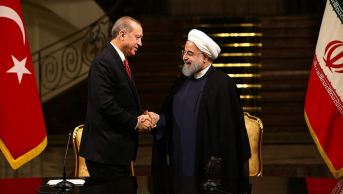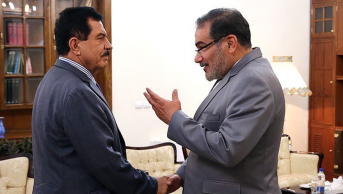The Iran-Russia Axis in the New Geopolitics of the Middle East

One of the most striking developments in the new geopolitical equation of the Middle East after the ‘Arab Spring’ is the rapprochement between Iran and Russia. The consecutive steps taken in the last couple of years and regional cooperation has turned the Iran-Russia relations into a ‘strategic partnership.’ This strategic relationship between Moscow and Tehran enabled Russia to become one of the important actors in the Middle Eastern politics.
The Recent Past of Iran-Russia Relations
Iran-Russia relations were largely improved in the 1990s. In this period, Russia became the most important arms provider for Iran. Besides, the foundations laid for the nuclear cooperation between the two countries became one of the symbols of Moscow-Tehran rapprochement. One other factor that facilitated close relations between the two countries in this period was the common concern for an American/Western and Turkish influence over the newly independent Central Asian and Caucasian states. For these reasons, Iran pursued a Russia-first policy in its relations with the regional countries.
Within the framework of ‘Look to the East’ policy during the presidency of Ahmadinejad, Iran gave utmost importance to its relations with Russia. In this period, especially the breakdown of relations with the Western countries due to the controversies over Iranian nuclear programme and referral of Iranian dossier to the UN Security Council made the Russian friendship as a permanent member of the Security Council vital for Iran. Trying to develop its relations with Moscow on every occasion, Iran applied for membership the Shanghai Cooperation Organization that was established under the leadership of Moscow and Beijing.
Nevertheless, some problems in Tehran-Moscow line caused questioning the quality of Iran-Russia relations. Firstly, Russia delayed to hand over the nuclear reactor it had built in Bushehr for a long time for various reasons. Secondly, that Russia did not veto the sanctions acts against Iran taken in the UN Security Council created disappointment for Iran. What is more, despite the agreement between the parties in 2008, Russia stopped selling S-300 missiles to Iran. Upon these developments Iranian public opinion started to discuss whether Russia was a trustable partner or not. It was argued that Russia had been misusing its position in the Security Council and its relations with Iran at the expense of its own interests. Some Iranian experts even asserted that Russia’s involvement in the negotiations between Iran and P5+1 states was a big mistake.
With the presidency of Hassan Rouhani, Iran started to search for opportunities to develop relations with the West; yet, it did not abandon the ‘Look to the East’ policy. Rouhani paid his first visit abroad to Bishkek to attend the Shanghai Cooperation Organization summit in September 2013. In a speech he gave in the beginning of 2014, Rouhani stated that a clean break would be made in the Iran-Russia relations. Shortly afterwards, high level visits were paid between Tehran and Moscow. The two countries signed a memorandum of understanding that was known as ‘oil for goods’ in August 2014. Accordingly, Russia would buy 500,000 barrels a day from Iran and would sell equivalent worth of goods. Thereby, the two countries targeted to increase their trade volume to 20 billion dollars in a short period of time. The steps taken for the improvement of relations between the two countries were not confined to economic issues. Iran agreed with Russia for the construction of two other nuclear plants in Bushehr in November 2014. Russian Minister of Defense paid the first official visit to Tehran after fifteen years in January 2015.
The improvement in Tehran-Moscow relations was regarded as a natural rapprochement between Russia, who had been subjected to the US and EU sanctions due to its annexation of Crimea in February 2014 and its involvement in Ukraine crisis, and Iran, who had been subjected to sanctions for a long time due to its nuclear programme. However, more than the rapprochement of the two states that were marginalized by the West, this development enabled the Iran-Russia relations to turn into a ‘strategic partnership.’ As a matter of fact, when the Russian Head of State, Putin, went directly to meet with Iranian Leader Ayatollah Khamenei just as he arrived Tehran on November 23, 2015, his act was regarded as the mark of the strategic partnership between the two states.
The Changing Nature of Iran-Russia Relations
The long history of relations between Iran and Russia led to distrust in Tehran on the part of Russian administration. A remarkable number of Iranian elites viewed Russia with suspicious eyes due to Russian territorial expansion in Iranian lands in the 19th century, its involvement in Iranian internal affairs, Iran’s occupation in the ‘Great Game’ played between Britain and Russia, ‘the Soviet threat’ and etc. Russia’s position against Iran in the issue of the status of the Caspian Sea after the dissolution of the Soviet Union, its approval of sanctions against Iran in the UN Security Council, its non-delivery of S-300 missiles increased the distrust against Russia. Moreover, it was argued that Iran and Russia pursued different and contradictory regional policies after the dissolution of the Soviet Union; thus, the nature of Tehran-Moscow relations was problematic. Lastly, departing from the assumption that these two countries were rivals in the international energy market due to their possession of the largest proven natural gas reserves in the world, a rapprochement between Tehran and Moscow was impossible.
The developments in the last couple of years between Tehran and Moscow despite actual and potential obstacles and differences due to the historical or structural reasons demonstrated that the regional interests and policies of Iran and Russia are not contradictory but complementary. Iran has always refrained from any act that will disturb Russia in the Caucasus and in Central Asia, and has acted together with Russia to prevent consolidation of American/Western and Turkish influence in the region. Also, the crisis of trust in Iran-Russia relations has been resolved in last years. Russian support for Iran in the nuclear negotiations and its insistence on Iran’s participation to the international meetings for the discussion of regional issues such as the Syrian crisis has considerably weakened the suspicious view of Iran towards Russia. The agreement for Russia’s construction of two other nuclear plants can also be considered within this framework. Likewise, one of the most important problems between Tehran and Moscow has been solved when transfer of S-300 missiles to Iran has begun in December 2015. From then on, new arms agreements and nuclear cooperation has been on the agenda of the two countries.
The most prominent participant of the Gas Exporting Countries Forum that was convened at the level of head of states and governments in November 2015 was Putin. Although this forum is not directly for cooperation between gas exporting countries, it facilitates dialogue among the states concerned including Iran and Russia. Hence, although Iran and Russia are rivals in the gas market, this rivalry will not harm their strategic relations. The bilateral relations between the two countries and the regional cooperation have become much more stronger. It is expected that the two states will be involved in more cooperative relations in the infrastructural investments, trade, banking sector as well as aeronautics, nuclear technology and defense industry. With the solution of the nuclear issue, the obstacle to Iran’s participation to the Shanghai Cooperation Organization will be removed. Hence, in the coming months Iranian government will begin a quest for full membership of the organization where it has already obtained an observer status. Iranian administration is also interested in the Eurasian Economic Union that has been formed under the Russian leadership and establishment of a free trade zone with Iran is under discussion. However, the ground where the strategic cooperation between the two states has become the most visible is the Syrian issue.
Iran-Russia Strategic Cooperation in Syria
Although having different expectations, Iran and Russia, who are of one mind regarding Assad administration’s staying in power, have been acting in coordination since the beginning of the Syrian crisis. Russia continued to provide arms supply to Assad administration and protected Assad administration, hence Iranian interests, both in the Security Council and in international conferences on Syrian crisis. Likewise, a probable American intervention against Assad administration was prevented though Russian mediation after the chemical attack in Guta in 2013. Russia, whose influence in the Syrian issue gradually increased, argued that Iran should also take part in the solution of this crisis. Finally, as a result of the Russian pressure, Iran was invited to Geneva II Conference in January 2014; but the invitation was withdrawn afterwards. Again due to Russian pressure, Iran attended International Syria Support Group meeting in Vienna on November 14, 2015.
When Russia started to organize airstrikes in Syria on September 30, Iran openly supported Russia. Iran referred its support to Russia as struggle against ISIS and takfiri terrorists and it ensured the participation of Iraqi government to this alliance. Syria, Iraq, Iran and Russia established ‘Information Center’ in Baghdad to coordinate the anti-ISIS struggle at the end of September. Likewise, the missiles rocketed from the Russian warships in the Caspian Sea stroked some targets in Syria over the Iranian and Iraqi airspace.
Iranian Deputy Chief of Staff M. Jazzayeri said: “Tehran gives support to Moscow and Russian people in this struggle. We think that the Russian operation is the right and necessary strategy.” Minister of Foreign Affairs Mohammad J. Zarif argued that Russian intervention was necessary since coalition forces under the leadership of the US had not struggled effectively against ISIS. Iranian Leader Khamenei praised Russian policies in Syria in his meeting with Putin in Tehran on November 23rd.
Iranian and Russian ‘strategic cooperation’ in the Syrian issue does not mean that they do not have any divergence of opinion or difference in their policies. Perhaps the most important of these differences is the relations of the parties with Israel. Putin is the first Russian president that has visited Israel and he gives great importance to relations with Israel. Just a very short time before Russian airstrikes began in Syria, Israeli Prime Minister B. Netanyahu went to Moscow on September 21, 2015 and met with Putin. At this meeting Putin gave assurance to Netanyahu that Hezbollah or other militias connected to Iran would not threaten Israel over Syrian territory and Russian presence in Syria would not hinder Israel’s ‘strategic’ operations.
Although Russian Deputy Minister of Foreign Affairs M. Bogdanov said in his statement on November 16, 2015 that his country did not regard Hezbollah or Hamas as terrorist organizations, Russian relations with Israel cast doubts on the future of Iran’s partnership with Russia. As a matter of fact, there are arguments stating that Russia has been trying to set its own game and Iran’s space has been gradually limited in this game. Therefore, there are criticisms and doubts about strategic partnership with Russia. Nonetheless, Putin-Khamenei meeting demonstrates that Iran-Russia strategic partnership has been blessed by the Iranian Leader.
Russia has been increasing its influence over Iran through its close relations. Thus, it prevents Iran from establishing good relations with the West in the new geopolitical balances in post-sanctions period. Iran, however, assures Russian support for its regional policies thorough improving its relations with Russia. Lastly, Russia’s strategic partnership with Iran allows Russia for playing a more active role in the Middle East.
This article was published in Ortadoğu Analiz journal with the title of "The Iran-Russia Axis in the New Geopolitics of the Middle East”











